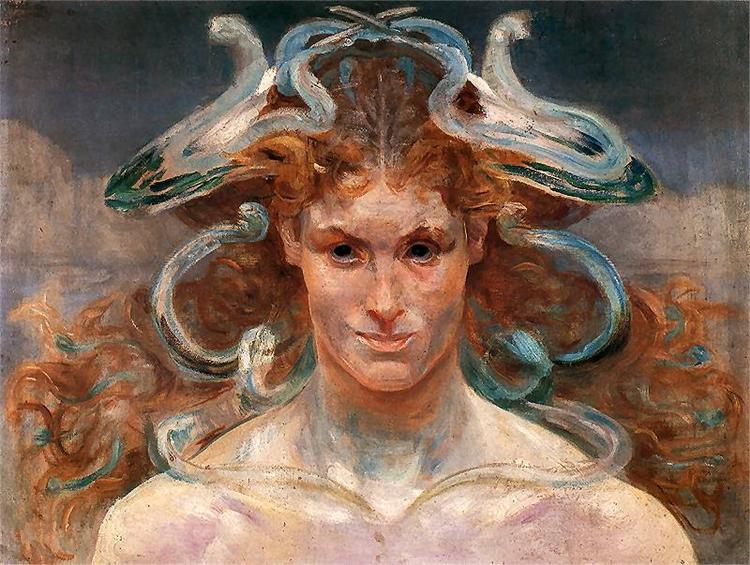Description
Jacek Malczewski's "Medusa" work is an outstanding example of symbolism and emotional complexity that characterizes the artistic production of the Polish painter at the end of the 19th century and the beginning of the 20th century. Malczewski, known for its pictorial narrative and its fusion of cultural and mythological elements, achieves a mediation between tradition and modernity on this canvas, thus creating a space where the figure of Medusa acquires an allegorical and intimate meaning.
The composition of "Medusa" unfolds in an environment in which the central figure stands as a multifaceted symbol. The Gorgon, with her serpentine hair, not only evokes fear, but also raises an introspection about the nature of beauty and monstrosity. The expression on her face is contemplative, almost melancholic, which invites the viewer to question the emotional experience she represents. The use of space, with a hacking background that suggests a dreamlike environment, reinforces the enigma atmosphere that surrounds the figure, transforming the work into a dialogue between light and shadow, the authentic and the illusory.
Malczewski uses a rich and varied color palette, which goes from deep green and blue tones, to golden illuminations that highlight certain parts of the composition. This chromatic choice contributes not only to the general atmosphere of the work, but can also be interpreted as a continuation of the symbolism that permeates previous treatments of the mythological figure. The snakes that crowned Medusa's head are found in shades that evoke both life and death, a dualism present in mythology that in Malczewski is accentuated by their ability to capture emotional subtleties through color use.
As for technical execution, Malczewski's style is characterized by almost meticulous precision, where each element of painting seems to have its reason for being. The texture of the canvas, the details in the serpentine hair and the shadows that play in the skin of the figure, all this is combined to create a rich visual experience. It is a testimony of its mastery that, despite the emotional and thematic complexity of the work, each element is in harmony with the whole, thus generating an immediate impact on the spectator.
Symbolism is undoubtedly the conductive thread of the work. By capturing Medusa in an instant of vulnerability, Malczewski offers a rereading of his figure, moving away from the exclusively monstrous interpretation that is usually attributed to him. Here, Medusa becomes a reflection of the internal struggles of humanity, the confusion between desire and horror. This approach gives viewers the opportunity to approach the theme of identity, power and loneliness, aspects that can resonate on a personal level and that remain relevant in contemporaneity.
In conclusion, "Medusa" by Jacek Malczewski is not simply a portrait of a mythological figure, but a deep exploration of the complexity of the human being. Through his technical skill and his thematic sensitivity, Malczewski manages to capture on this canvas a meditation on pain and beauty, joining the legacy of mythology with modern introspection, concepts that continue to challenge us and cause us to reflect on our own existence. This work thus becomes a benchmark for Polish symbolism and a clear example of the wealth and importance of Malczewski's work in the context of art history.
KUADROS ©, a famous paint on your wall.
Hand-made oil painting reproductions, with the quality of professional artists and the distinctive seal of KUADROS ©.
Art reproduction service with satisfaction guarantee. If you are not completely satisfied with the replica of your painting, we refund your money 100%.

